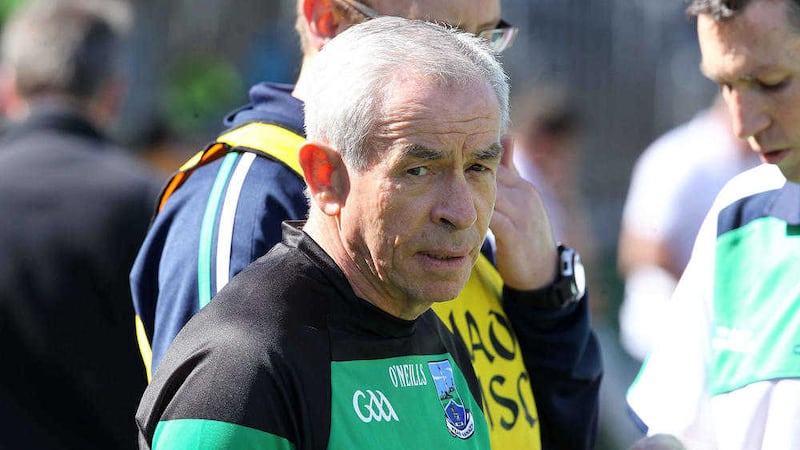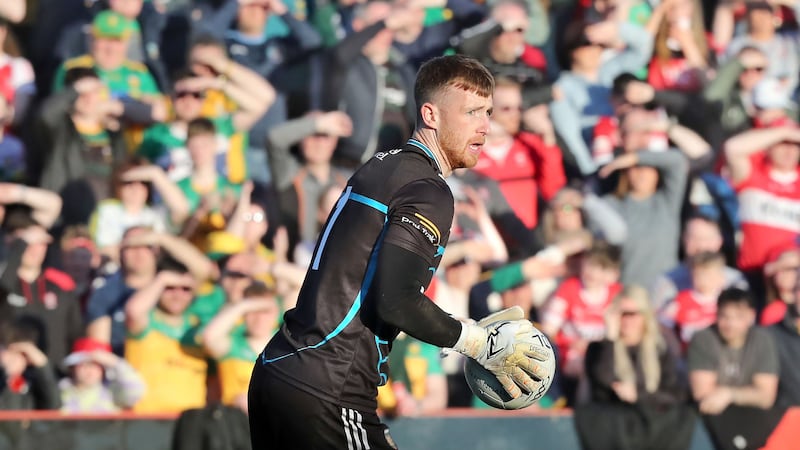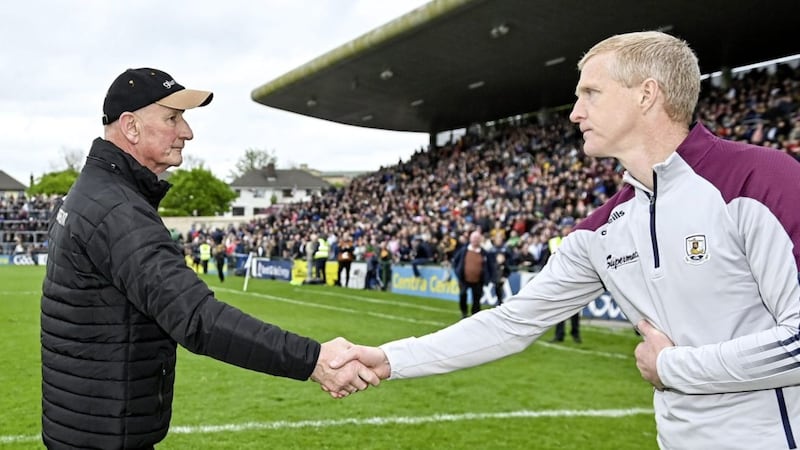“Why should Fermanagh not be able to stand up and say ‘our objective is to win our first-ever Ulster Championship’? I think it would be a marvellous achievement for this group of players and we have the players to do it. I don’t say that with any kind of arrogance, I say it with belief, total belief."
Pete McGrath after Fermanagh were beaten by Dublin last August
NINETY-SEVEN per cent of managers in sport are faced with the same task. No matter what the game, a huge percentage of those who take a team will never win anything of any substance.
That is particularly true of the GAA. Around the country at club level, there are upwards of 3,000 men (taking into account reserves) managing adult football teams in 2016. Barely 100 of them will win a trophy this year.
At county level, the lower-tiers of the National League structure offer silverware to those who would not otherwise see it. Neither Louth nor Clare will win their respective provincial Championships this summer, but Colin Kelly and Colm Collins will finish the year having brought rare silverware to those two counties.
Unless you’re parachuted into a job with one of the top half-dozen teams in the country, the aim is to go in and somehow improve your team, while constantly reminding the media and supporters that yours is a team ‘in transition’.
A good manager will get that extra 10 or 15 per cent out of his players. You’ve seen it with Pete McGrath in Fermanagh. Speaking to him last week, the boyish enthusiasm hasn’t diminished.
Of it all, he says he still enjoys interacting with players and helping them develop as young men the most. The young men in his charge have reacted positively to that. Declan McCusker told of how the squad felt empowered and trusted by their manager’s willingness to take their ideas on board following the Ulster SFC defeat to Antrim in 2014.
Tactically, they’ve evolved, but he also breathed confidence into the unit to the point where they survived in Division Two without many key players. Fermanagh have developed a level of depth you wouldn’t traditionally associate with one of the smallest counties in Ireland.
One of the key differences between Fermanagh and Antrim last Sunday was communication. From the back of the sheltered stand in Brewster Park, you could hear almost every word from the pitch.
The winners never stopped talking. From Chris Snow out, their defensive structure was masterfully organised. Their attack, crucially, bore similar characteristics, with the off-shoulder runners calling the timing and direction of the pass.
Antrim lacked that badly. They didn’t have the same audible confidence in themselves. What resulted was a shapeless first-half in which they seemed to want to kick the ball early, but couldn’t find the men inside and hadn’t the runners lined up from midfield to change it.
Above all, Fermanagh have developed a belief they can compete with anything Ulster football throws at them. Malachy O’Rourke was the last man to leave such a feeling coursing through the lakelands, when he took them to an Ulster final eight-years-ago.
Pete McGrath came out with the above quote minutes after losing that All-Ireland quarter-final to Dublin last year. Making such a brash public declaration retains the potential for looking foolish, should Donegal prove too much for them in four weeks' time.
But you don’t sense that the Tír Chonaill men will get it all their own way and that is because Fermanagh’s unit is woven together by the spirit they’ve fostered over the past few years together.
The sheer positivity of the man at the helm unquestionably feeds the players but, equally, they need results to begin to truly believe it themselves. Winning promotion from Division Three and then staying up in a tough, Ulster-centric Division Two sandwiched that run to an All-Ireland quarter-final. They look to the horizon now with no fear and see themselves as equals in this most competitive of Championships.
Contrast that with how the Laois players will be feeling about themselves this week. They were far from impressive in eventually shrugging off the sticky challenge of Division Four Wicklow. But for Mick Lillis to come out and say what he did will hardly give much heart to his players.
In case you missed it, the Laois boss said: “We have the same thing to lose as Dublin - we have a match to lose. But the bottom line is that Dublin are way ahead of everyone else, whether we like it or we don’t like it.
“Somebody said it to me the pick of the four teams today, Laois, Wicklow, Louth and Carlow, wouldn’t beat them and that’s probably true.”
Imagine you’re one of those players turning up to training on Tuesday night having heard that quote for the past three days. Mick Lillis can’t win now. What does he tell his players between now and June 4? If he tries to tell them they can beat Dublin, they’ll hardly buy it. If he tries to take a team in to face Dublin with a mentality of damage limitation, then there’s every chance they will take a lacing in Nowlan Park.
When that first Dublin goal hits the net, you find out the character of your team. When Fermanagh found themselves 1-13 to 0-6 down to Dublin at half-time, they rallied and scored 2-9 in the second-half.
That was character. This Dublin team never takes their foot off the throat of anyone. In the last three years, their combined winning margin from nine Leinster Championship games is 141 points. They’ve won eight of them by 10 points or more, stretching right up to that 27-point margin between them and Longford last year.
The rest of Leinster has been woefully railroaded for the last 15 years, none of them with any sense of belief that they can compete. All it takes is that first green flag to be lifted and they all collapse. The same will happen to Laois in just under three weeks' time.
Had Pete McGrath taken Mick Lillis’ attitude, Fermanagh would have suffered the same fate as Dublin’s mentally fragile Leinster opponents. Instead, the positivity of their manager is reflected by their improving results.
Fermanagh may not beat Donegal, but you sure as hell won’t hear McGrath give any hint of weakness in the next four weeks and you sure as hell won’t see them beaten by 20 points.








